Law 12 Assignment: Contract Law, Consumer Guarantees, and Advertising
VerifiedAdded on 2019/10/30
|12
|2310
|154
Homework Assignment
AI Summary
This Law 12 assignment explores two key areas of law: contract formation and consumer protection. Part A analyzes whether a contract exists between two parties, examining the elements of offer, acceptance, and the application of the Electronic Transactions Act 1999. It uses case law to illustrate key principles. Part B addresses consumer rights when a supplier breaches contract terms, focusing on the guarantees provided by the Australian Consumer Law (ACL), specifically sections 60 and 61 of the Competition and Consumer Act 2010. It examines remedies available to consumers, including compensation. Answer 2 delves into advertising regulations, focusing on misleading and deceptive conduct under sections 18 and 29 of the ACL, and provides a detailed analysis of a case law example illustrating the application of these principles.
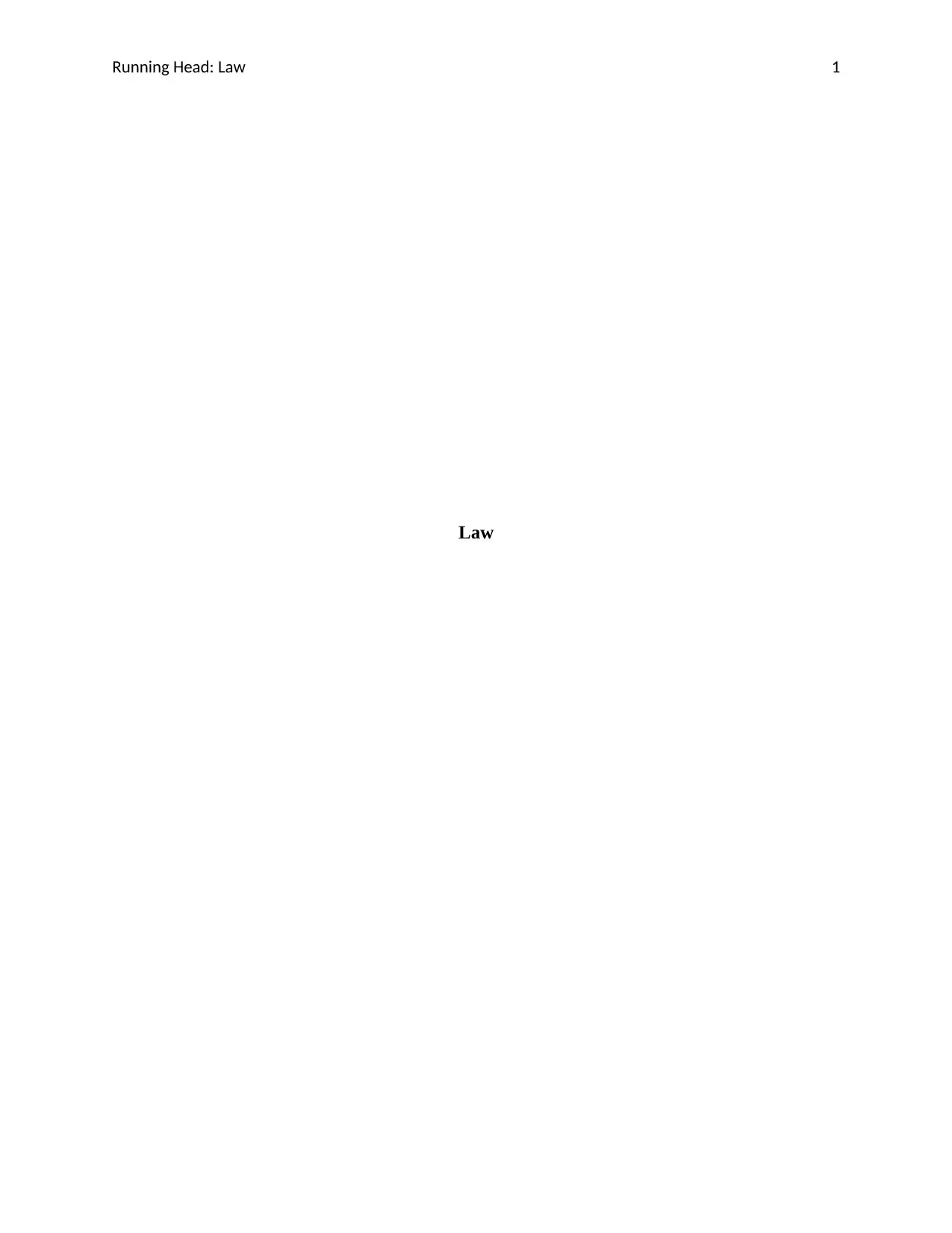
Running Head: Law 1
Law
Law
Paraphrase This Document
Need a fresh take? Get an instant paraphrase of this document with our AI Paraphraser
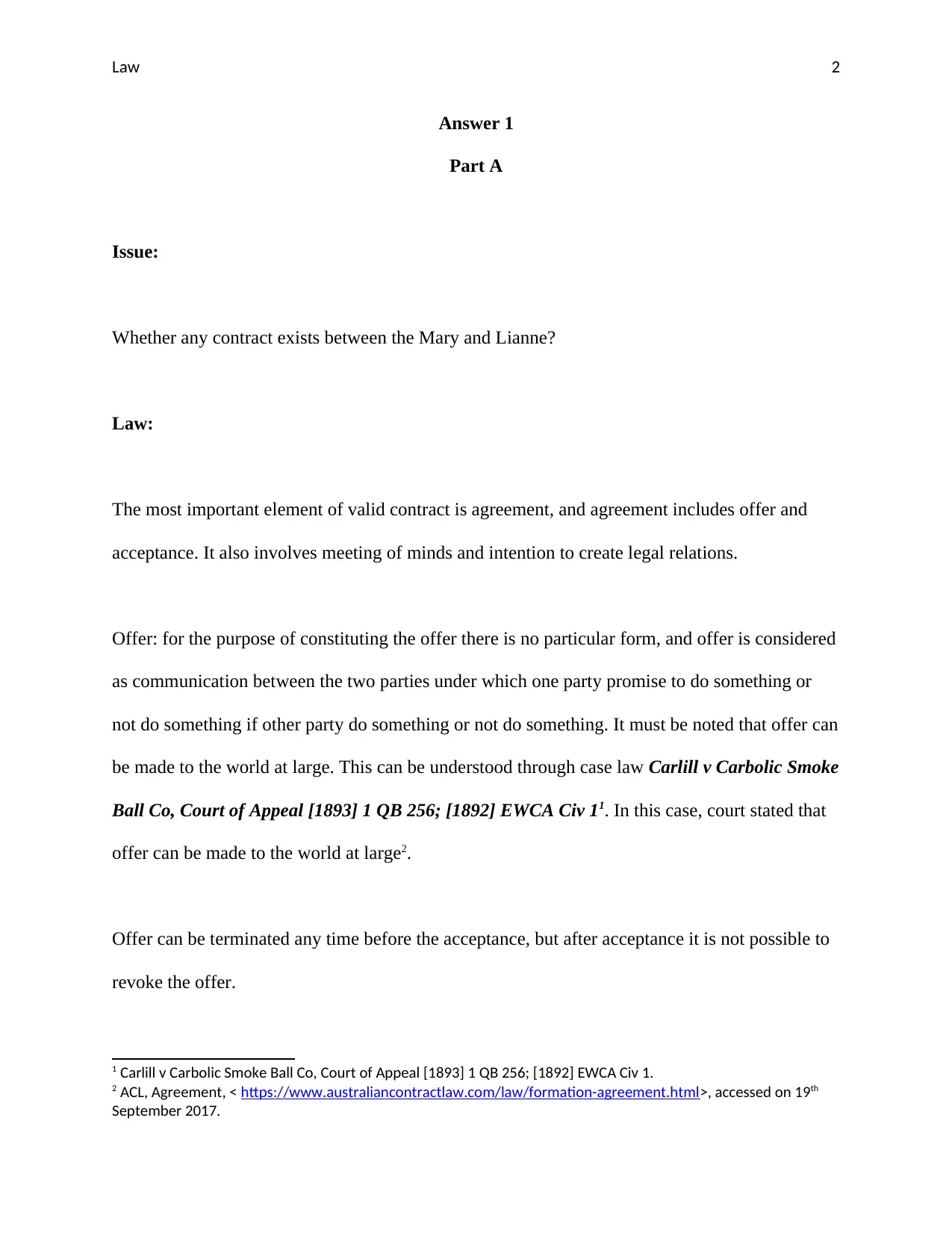
Law 2
Answer 1
Part A
Issue:
Whether any contract exists between the Mary and Lianne?
Law:
The most important element of valid contract is agreement, and agreement includes offer and
acceptance. It also involves meeting of minds and intention to create legal relations.
Offer: for the purpose of constituting the offer there is no particular form, and offer is considered
as communication between the two parties under which one party promise to do something or
not do something if other party do something or not do something. It must be noted that offer can
be made to the world at large. This can be understood through case law Carlill v Carbolic Smoke
Ball Co, Court of Appeal [1893] 1 QB 256; [1892] EWCA Civ 11. In this case, court stated that
offer can be made to the world at large2.
Offer can be terminated any time before the acceptance, but after acceptance it is not possible to
revoke the offer.
1 Carlill v Carbolic Smoke Ball Co, Court of Appeal [1893] 1 QB 256; [1892] EWCA Civ 1.
2 ACL, Agreement, < https://www.australiancontractlaw.com/law/formation-agreement.html>, accessed on 19th
September 2017.
Answer 1
Part A
Issue:
Whether any contract exists between the Mary and Lianne?
Law:
The most important element of valid contract is agreement, and agreement includes offer and
acceptance. It also involves meeting of minds and intention to create legal relations.
Offer: for the purpose of constituting the offer there is no particular form, and offer is considered
as communication between the two parties under which one party promise to do something or
not do something if other party do something or not do something. It must be noted that offer can
be made to the world at large. This can be understood through case law Carlill v Carbolic Smoke
Ball Co, Court of Appeal [1893] 1 QB 256; [1892] EWCA Civ 11. In this case, court stated that
offer can be made to the world at large2.
Offer can be terminated any time before the acceptance, but after acceptance it is not possible to
revoke the offer.
1 Carlill v Carbolic Smoke Ball Co, Court of Appeal [1893] 1 QB 256; [1892] EWCA Civ 1.
2 ACL, Agreement, < https://www.australiancontractlaw.com/law/formation-agreement.html>, accessed on 19th
September 2017.
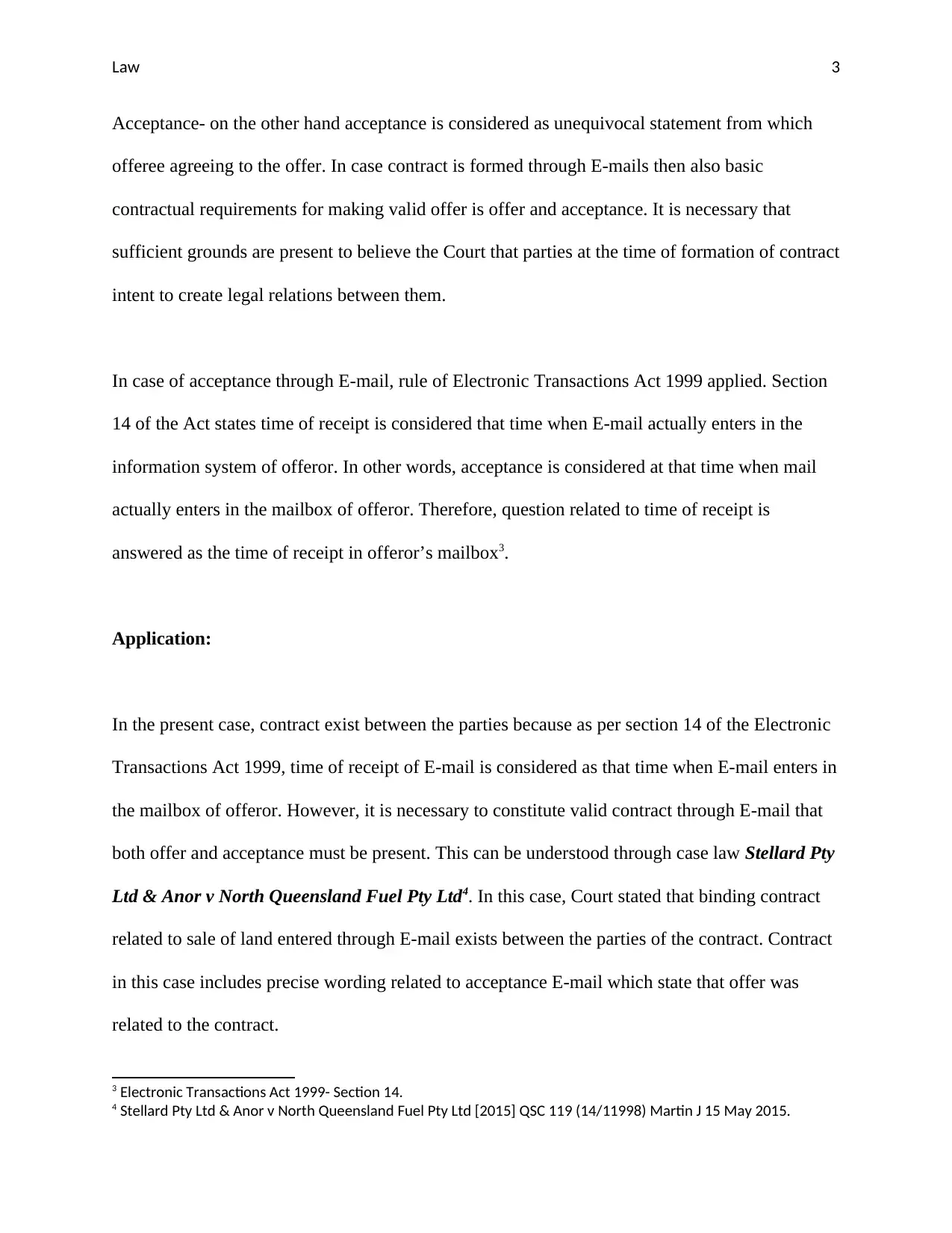
Law 3
Acceptance- on the other hand acceptance is considered as unequivocal statement from which
offeree agreeing to the offer. In case contract is formed through E-mails then also basic
contractual requirements for making valid offer is offer and acceptance. It is necessary that
sufficient grounds are present to believe the Court that parties at the time of formation of contract
intent to create legal relations between them.
In case of acceptance through E-mail, rule of Electronic Transactions Act 1999 applied. Section
14 of the Act states time of receipt is considered that time when E-mail actually enters in the
information system of offeror. In other words, acceptance is considered at that time when mail
actually enters in the mailbox of offeror. Therefore, question related to time of receipt is
answered as the time of receipt in offeror’s mailbox3.
Application:
In the present case, contract exist between the parties because as per section 14 of the Electronic
Transactions Act 1999, time of receipt of E-mail is considered as that time when E-mail enters in
the mailbox of offeror. However, it is necessary to constitute valid contract through E-mail that
both offer and acceptance must be present. This can be understood through case law Stellard Pty
Ltd & Anor v North Queensland Fuel Pty Ltd4. In this case, Court stated that binding contract
related to sale of land entered through E-mail exists between the parties of the contract. Contract
in this case includes precise wording related to acceptance E-mail which state that offer was
related to the contract.
3 Electronic Transactions Act 1999- Section 14.
4 Stellard Pty Ltd & Anor v North Queensland Fuel Pty Ltd [2015] QSC 119 (14/11998) Martin J 15 May 2015.
Acceptance- on the other hand acceptance is considered as unequivocal statement from which
offeree agreeing to the offer. In case contract is formed through E-mails then also basic
contractual requirements for making valid offer is offer and acceptance. It is necessary that
sufficient grounds are present to believe the Court that parties at the time of formation of contract
intent to create legal relations between them.
In case of acceptance through E-mail, rule of Electronic Transactions Act 1999 applied. Section
14 of the Act states time of receipt is considered that time when E-mail actually enters in the
information system of offeror. In other words, acceptance is considered at that time when mail
actually enters in the mailbox of offeror. Therefore, question related to time of receipt is
answered as the time of receipt in offeror’s mailbox3.
Application:
In the present case, contract exist between the parties because as per section 14 of the Electronic
Transactions Act 1999, time of receipt of E-mail is considered as that time when E-mail enters in
the mailbox of offeror. However, it is necessary to constitute valid contract through E-mail that
both offer and acceptance must be present. This can be understood through case law Stellard Pty
Ltd & Anor v North Queensland Fuel Pty Ltd4. In this case, Court stated that binding contract
related to sale of land entered through E-mail exists between the parties of the contract. Contract
in this case includes precise wording related to acceptance E-mail which state that offer was
related to the contract.
3 Electronic Transactions Act 1999- Section 14.
4 Stellard Pty Ltd & Anor v North Queensland Fuel Pty Ltd [2015] QSC 119 (14/11998) Martin J 15 May 2015.
⊘ This is a preview!⊘
Do you want full access?
Subscribe today to unlock all pages.

Trusted by 1+ million students worldwide
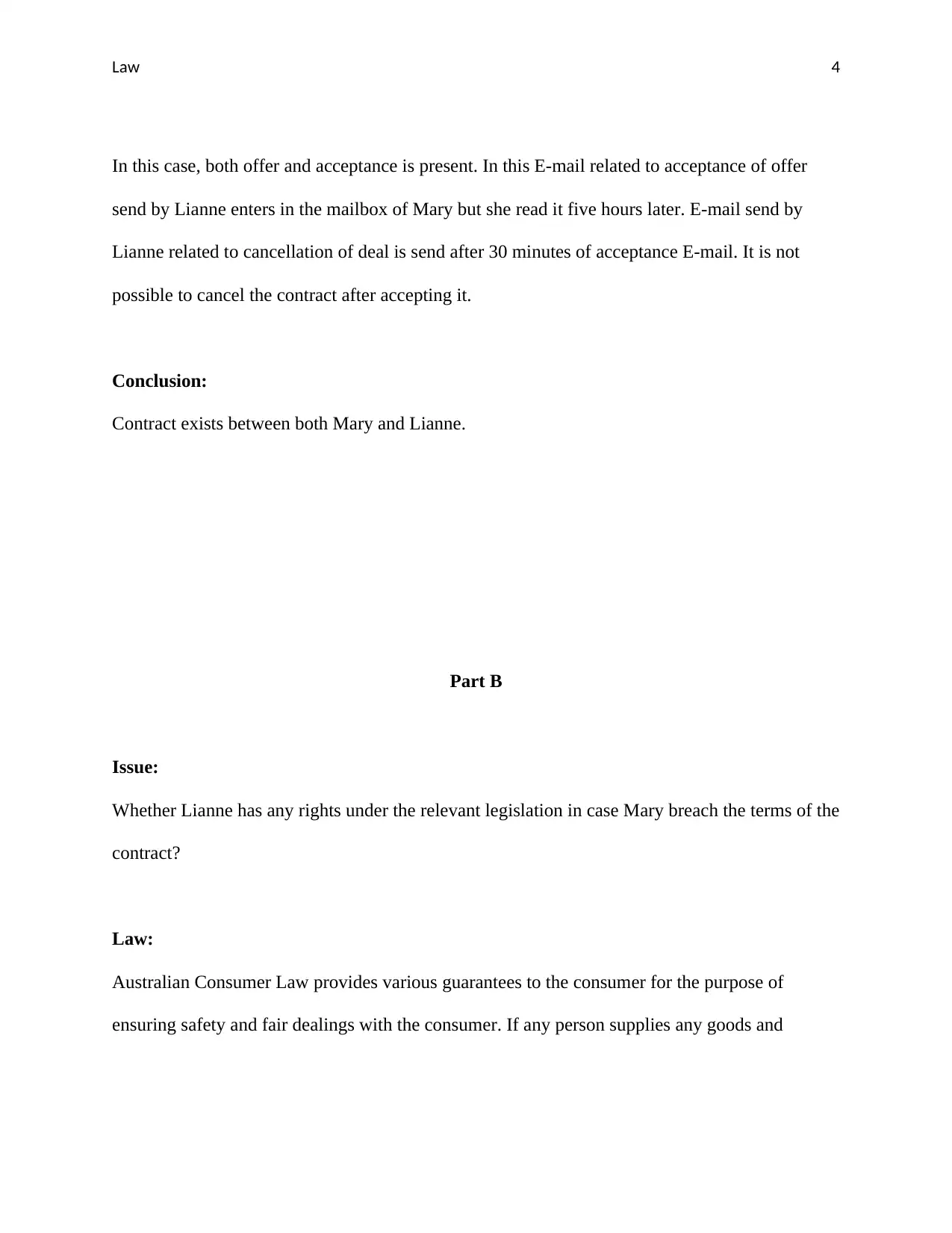
Law 4
In this case, both offer and acceptance is present. In this E-mail related to acceptance of offer
send by Lianne enters in the mailbox of Mary but she read it five hours later. E-mail send by
Lianne related to cancellation of deal is send after 30 minutes of acceptance E-mail. It is not
possible to cancel the contract after accepting it.
Conclusion:
Contract exists between both Mary and Lianne.
Part B
Issue:
Whether Lianne has any rights under the relevant legislation in case Mary breach the terms of the
contract?
Law:
Australian Consumer Law provides various guarantees to the consumer for the purpose of
ensuring safety and fair dealings with the consumer. If any person supplies any goods and
In this case, both offer and acceptance is present. In this E-mail related to acceptance of offer
send by Lianne enters in the mailbox of Mary but she read it five hours later. E-mail send by
Lianne related to cancellation of deal is send after 30 minutes of acceptance E-mail. It is not
possible to cancel the contract after accepting it.
Conclusion:
Contract exists between both Mary and Lianne.
Part B
Issue:
Whether Lianne has any rights under the relevant legislation in case Mary breach the terms of the
contract?
Law:
Australian Consumer Law provides various guarantees to the consumer for the purpose of
ensuring safety and fair dealings with the consumer. If any person supplies any goods and
Paraphrase This Document
Need a fresh take? Get an instant paraphrase of this document with our AI Paraphraser
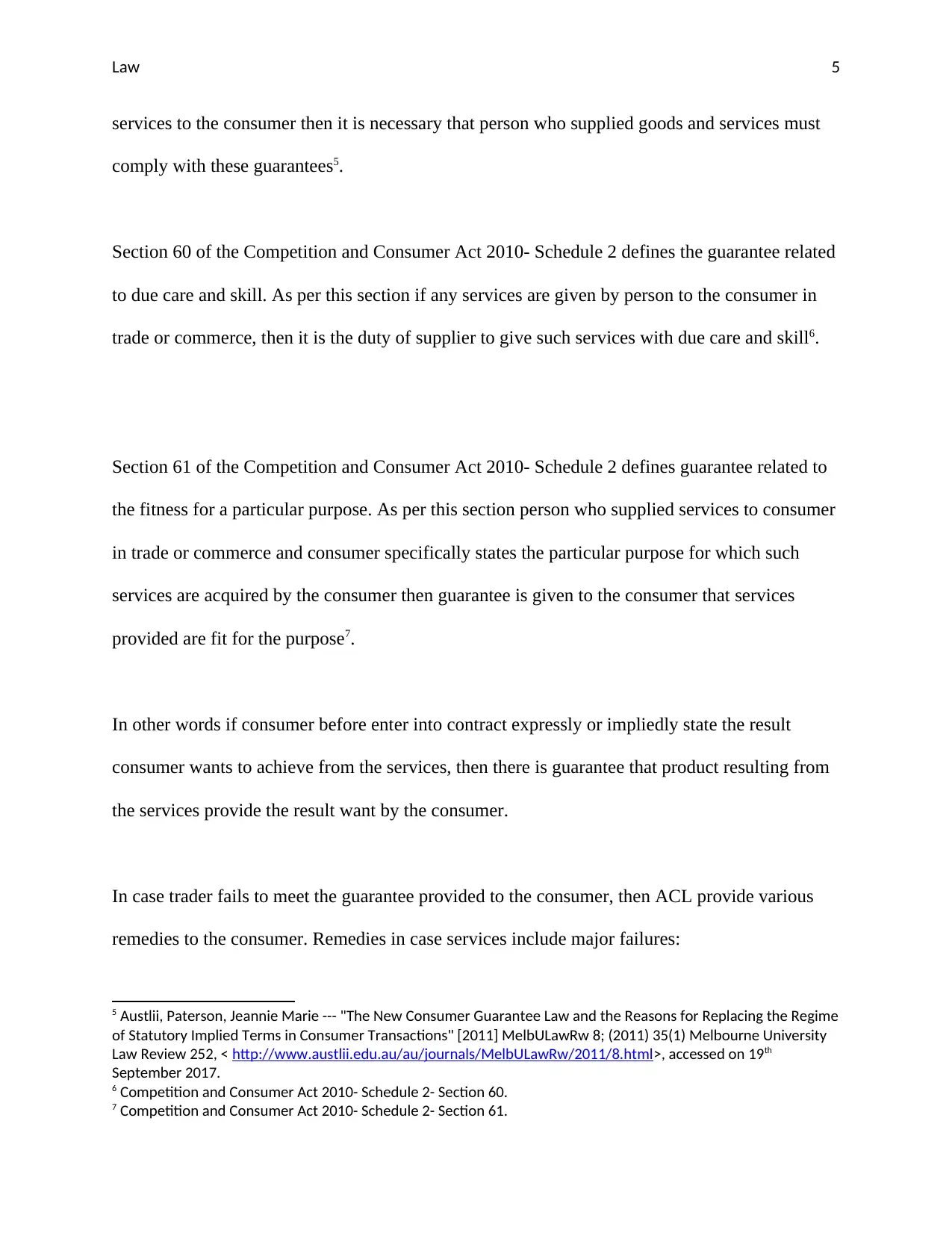
Law 5
services to the consumer then it is necessary that person who supplied goods and services must
comply with these guarantees5.
Section 60 of the Competition and Consumer Act 2010- Schedule 2 defines the guarantee related
to due care and skill. As per this section if any services are given by person to the consumer in
trade or commerce, then it is the duty of supplier to give such services with due care and skill6.
Section 61 of the Competition and Consumer Act 2010- Schedule 2 defines guarantee related to
the fitness for a particular purpose. As per this section person who supplied services to consumer
in trade or commerce and consumer specifically states the particular purpose for which such
services are acquired by the consumer then guarantee is given to the consumer that services
provided are fit for the purpose7.
In other words if consumer before enter into contract expressly or impliedly state the result
consumer wants to achieve from the services, then there is guarantee that product resulting from
the services provide the result want by the consumer.
In case trader fails to meet the guarantee provided to the consumer, then ACL provide various
remedies to the consumer. Remedies in case services include major failures:
5 Austlii, Paterson, Jeannie Marie --- "The New Consumer Guarantee Law and the Reasons for Replacing the Regime
of Statutory Implied Terms in Consumer Transactions" [2011] MelbULawRw 8; (2011) 35(1) Melbourne University
Law Review 252, < http://www.austlii.edu.au/au/journals/MelbULawRw/2011/8.html>, accessed on 19th
September 2017.
6 Competition and Consumer Act 2010- Schedule 2- Section 60.
7 Competition and Consumer Act 2010- Schedule 2- Section 61.
services to the consumer then it is necessary that person who supplied goods and services must
comply with these guarantees5.
Section 60 of the Competition and Consumer Act 2010- Schedule 2 defines the guarantee related
to due care and skill. As per this section if any services are given by person to the consumer in
trade or commerce, then it is the duty of supplier to give such services with due care and skill6.
Section 61 of the Competition and Consumer Act 2010- Schedule 2 defines guarantee related to
the fitness for a particular purpose. As per this section person who supplied services to consumer
in trade or commerce and consumer specifically states the particular purpose for which such
services are acquired by the consumer then guarantee is given to the consumer that services
provided are fit for the purpose7.
In other words if consumer before enter into contract expressly or impliedly state the result
consumer wants to achieve from the services, then there is guarantee that product resulting from
the services provide the result want by the consumer.
In case trader fails to meet the guarantee provided to the consumer, then ACL provide various
remedies to the consumer. Remedies in case services include major failures:
5 Austlii, Paterson, Jeannie Marie --- "The New Consumer Guarantee Law and the Reasons for Replacing the Regime
of Statutory Implied Terms in Consumer Transactions" [2011] MelbULawRw 8; (2011) 35(1) Melbourne University
Law Review 252, < http://www.austlii.edu.au/au/journals/MelbULawRw/2011/8.html>, accessed on 19th
September 2017.
6 Competition and Consumer Act 2010- Schedule 2- Section 60.
7 Competition and Consumer Act 2010- Schedule 2- Section 61.
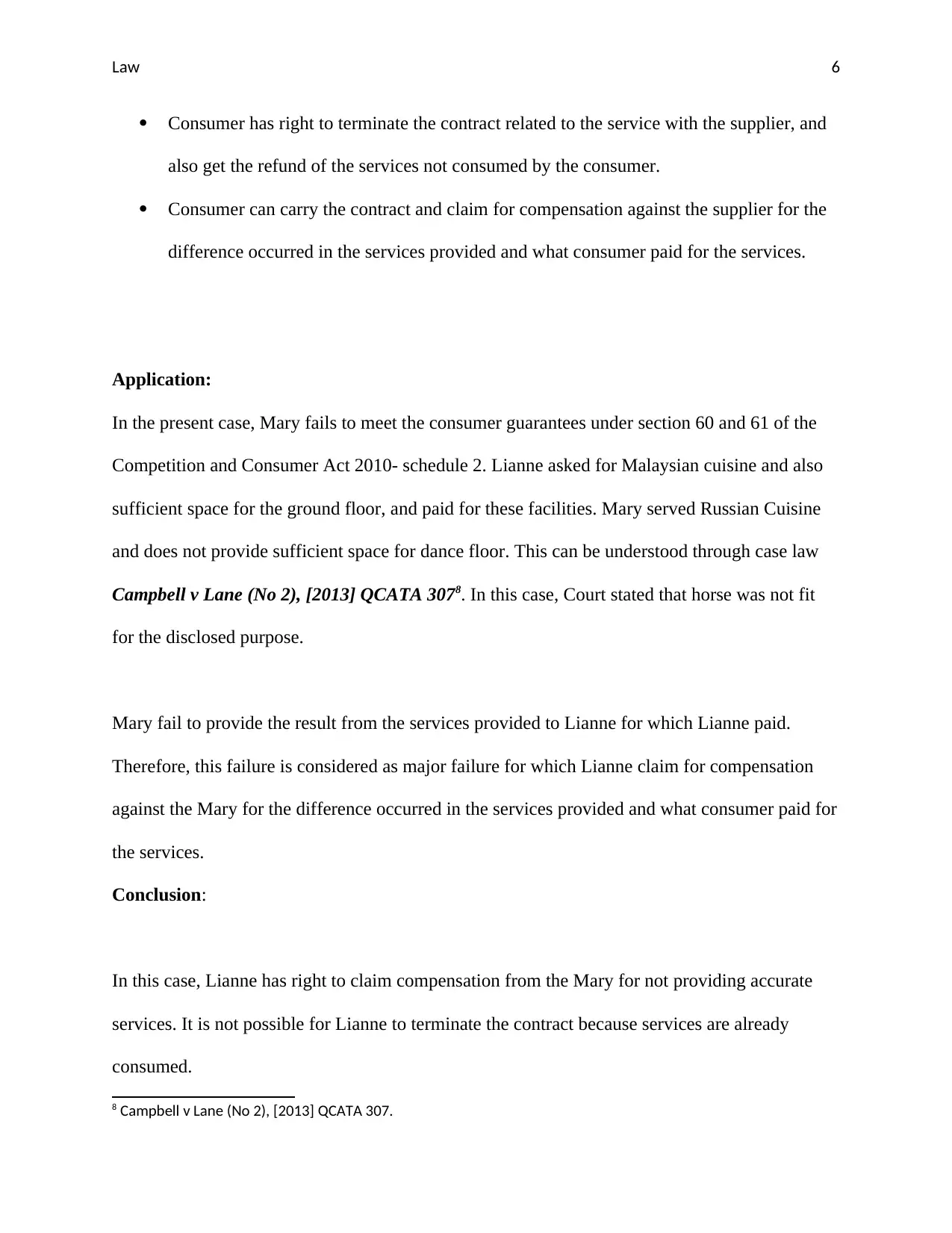
Law 6
Consumer has right to terminate the contract related to the service with the supplier, and
also get the refund of the services not consumed by the consumer.
Consumer can carry the contract and claim for compensation against the supplier for the
difference occurred in the services provided and what consumer paid for the services.
Application:
In the present case, Mary fails to meet the consumer guarantees under section 60 and 61 of the
Competition and Consumer Act 2010- schedule 2. Lianne asked for Malaysian cuisine and also
sufficient space for the ground floor, and paid for these facilities. Mary served Russian Cuisine
and does not provide sufficient space for dance floor. This can be understood through case law
Campbell v Lane (No 2), [2013] QCATA 3078. In this case, Court stated that horse was not fit
for the disclosed purpose.
Mary fail to provide the result from the services provided to Lianne for which Lianne paid.
Therefore, this failure is considered as major failure for which Lianne claim for compensation
against the Mary for the difference occurred in the services provided and what consumer paid for
the services.
Conclusion:
In this case, Lianne has right to claim compensation from the Mary for not providing accurate
services. It is not possible for Lianne to terminate the contract because services are already
consumed.
8 Campbell v Lane (No 2), [2013] QCATA 307.
Consumer has right to terminate the contract related to the service with the supplier, and
also get the refund of the services not consumed by the consumer.
Consumer can carry the contract and claim for compensation against the supplier for the
difference occurred in the services provided and what consumer paid for the services.
Application:
In the present case, Mary fails to meet the consumer guarantees under section 60 and 61 of the
Competition and Consumer Act 2010- schedule 2. Lianne asked for Malaysian cuisine and also
sufficient space for the ground floor, and paid for these facilities. Mary served Russian Cuisine
and does not provide sufficient space for dance floor. This can be understood through case law
Campbell v Lane (No 2), [2013] QCATA 3078. In this case, Court stated that horse was not fit
for the disclosed purpose.
Mary fail to provide the result from the services provided to Lianne for which Lianne paid.
Therefore, this failure is considered as major failure for which Lianne claim for compensation
against the Mary for the difference occurred in the services provided and what consumer paid for
the services.
Conclusion:
In this case, Lianne has right to claim compensation from the Mary for not providing accurate
services. It is not possible for Lianne to terminate the contract because services are already
consumed.
8 Campbell v Lane (No 2), [2013] QCATA 307.
⊘ This is a preview!⊘
Do you want full access?
Subscribe today to unlock all pages.

Trusted by 1+ million students worldwide
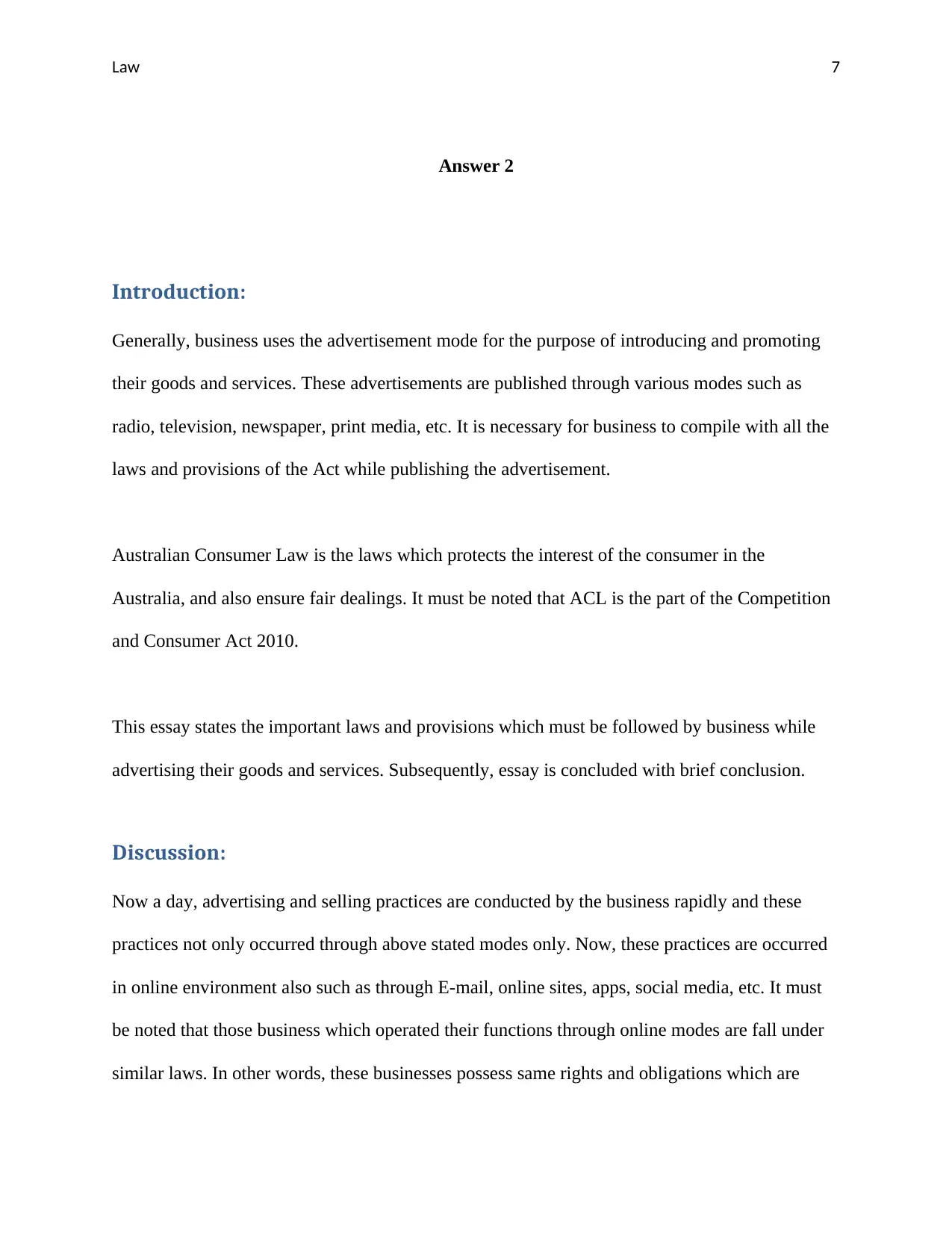
Law 7
Answer 2
Introduction:
Generally, business uses the advertisement mode for the purpose of introducing and promoting
their goods and services. These advertisements are published through various modes such as
radio, television, newspaper, print media, etc. It is necessary for business to compile with all the
laws and provisions of the Act while publishing the advertisement.
Australian Consumer Law is the laws which protects the interest of the consumer in the
Australia, and also ensure fair dealings. It must be noted that ACL is the part of the Competition
and Consumer Act 2010.
This essay states the important laws and provisions which must be followed by business while
advertising their goods and services. Subsequently, essay is concluded with brief conclusion.
Discussion:
Now a day, advertising and selling practices are conducted by the business rapidly and these
practices not only occurred through above stated modes only. Now, these practices are occurred
in online environment also such as through E-mail, online sites, apps, social media, etc. It must
be noted that those business which operated their functions through online modes are fall under
similar laws. In other words, these businesses possess same rights and obligations which are
Answer 2
Introduction:
Generally, business uses the advertisement mode for the purpose of introducing and promoting
their goods and services. These advertisements are published through various modes such as
radio, television, newspaper, print media, etc. It is necessary for business to compile with all the
laws and provisions of the Act while publishing the advertisement.
Australian Consumer Law is the laws which protects the interest of the consumer in the
Australia, and also ensure fair dealings. It must be noted that ACL is the part of the Competition
and Consumer Act 2010.
This essay states the important laws and provisions which must be followed by business while
advertising their goods and services. Subsequently, essay is concluded with brief conclusion.
Discussion:
Now a day, advertising and selling practices are conducted by the business rapidly and these
practices not only occurred through above stated modes only. Now, these practices are occurred
in online environment also such as through E-mail, online sites, apps, social media, etc. It must
be noted that those business which operated their functions through online modes are fall under
similar laws. In other words, these businesses possess same rights and obligations which are
Paraphrase This Document
Need a fresh take? Get an instant paraphrase of this document with our AI Paraphraser
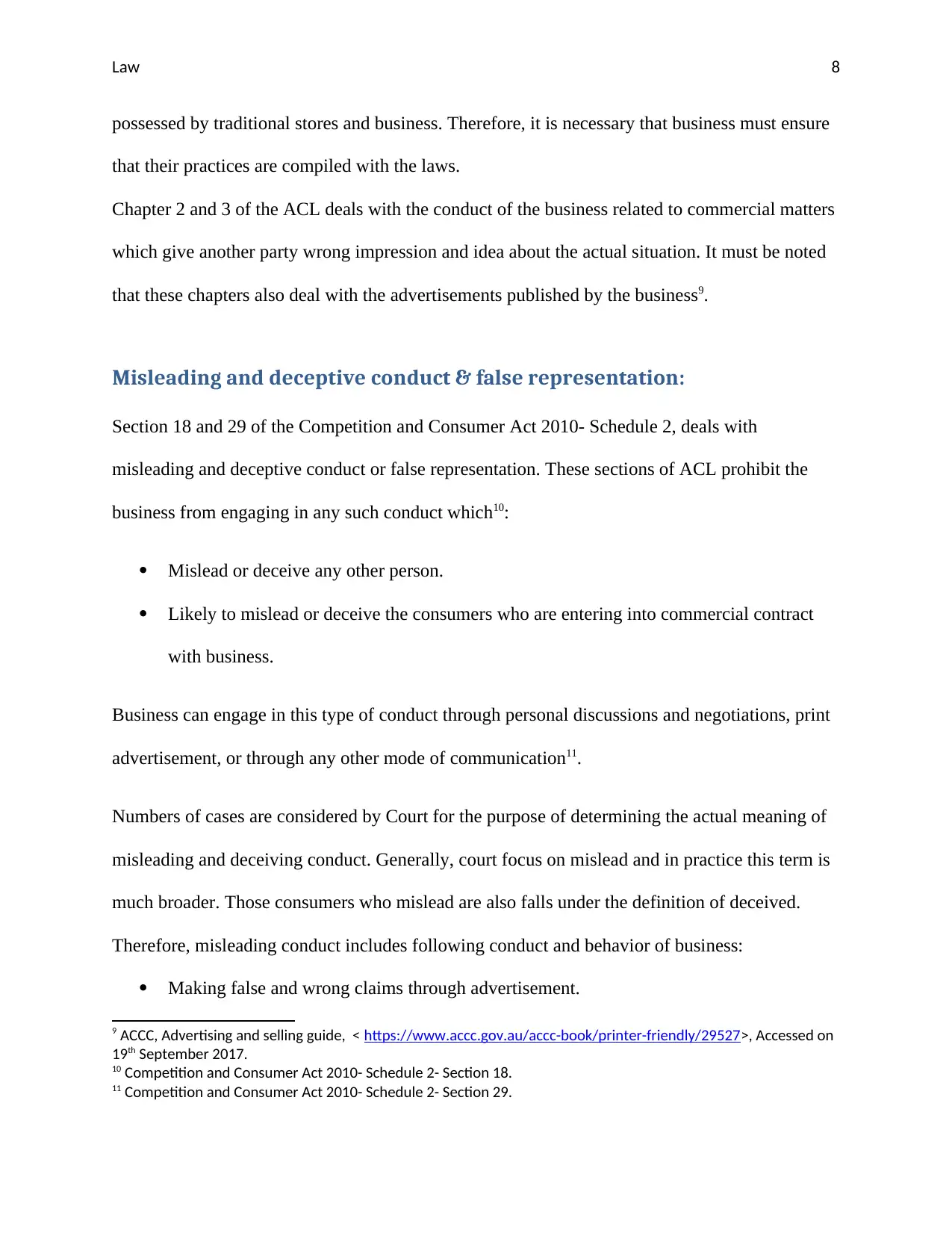
Law 8
possessed by traditional stores and business. Therefore, it is necessary that business must ensure
that their practices are compiled with the laws.
Chapter 2 and 3 of the ACL deals with the conduct of the business related to commercial matters
which give another party wrong impression and idea about the actual situation. It must be noted
that these chapters also deal with the advertisements published by the business9.
Misleading and deceptive conduct & false representation:
Section 18 and 29 of the Competition and Consumer Act 2010- Schedule 2, deals with
misleading and deceptive conduct or false representation. These sections of ACL prohibit the
business from engaging in any such conduct which10:
Mislead or deceive any other person.
Likely to mislead or deceive the consumers who are entering into commercial contract
with business.
Business can engage in this type of conduct through personal discussions and negotiations, print
advertisement, or through any other mode of communication11.
Numbers of cases are considered by Court for the purpose of determining the actual meaning of
misleading and deceiving conduct. Generally, court focus on mislead and in practice this term is
much broader. Those consumers who mislead are also falls under the definition of deceived.
Therefore, misleading conduct includes following conduct and behavior of business:
Making false and wrong claims through advertisement.
9 ACCC, Advertising and selling guide, < https://www.accc.gov.au/accc-book/printer-friendly/29527>, Accessed on
19th September 2017.
10 Competition and Consumer Act 2010- Schedule 2- Section 18.
11 Competition and Consumer Act 2010- Schedule 2- Section 29.
possessed by traditional stores and business. Therefore, it is necessary that business must ensure
that their practices are compiled with the laws.
Chapter 2 and 3 of the ACL deals with the conduct of the business related to commercial matters
which give another party wrong impression and idea about the actual situation. It must be noted
that these chapters also deal with the advertisements published by the business9.
Misleading and deceptive conduct & false representation:
Section 18 and 29 of the Competition and Consumer Act 2010- Schedule 2, deals with
misleading and deceptive conduct or false representation. These sections of ACL prohibit the
business from engaging in any such conduct which10:
Mislead or deceive any other person.
Likely to mislead or deceive the consumers who are entering into commercial contract
with business.
Business can engage in this type of conduct through personal discussions and negotiations, print
advertisement, or through any other mode of communication11.
Numbers of cases are considered by Court for the purpose of determining the actual meaning of
misleading and deceiving conduct. Generally, court focus on mislead and in practice this term is
much broader. Those consumers who mislead are also falls under the definition of deceived.
Therefore, misleading conduct includes following conduct and behavior of business:
Making false and wrong claims through advertisement.
9 ACCC, Advertising and selling guide, < https://www.accc.gov.au/accc-book/printer-friendly/29527>, Accessed on
19th September 2017.
10 Competition and Consumer Act 2010- Schedule 2- Section 18.
11 Competition and Consumer Act 2010- Schedule 2- Section 29.
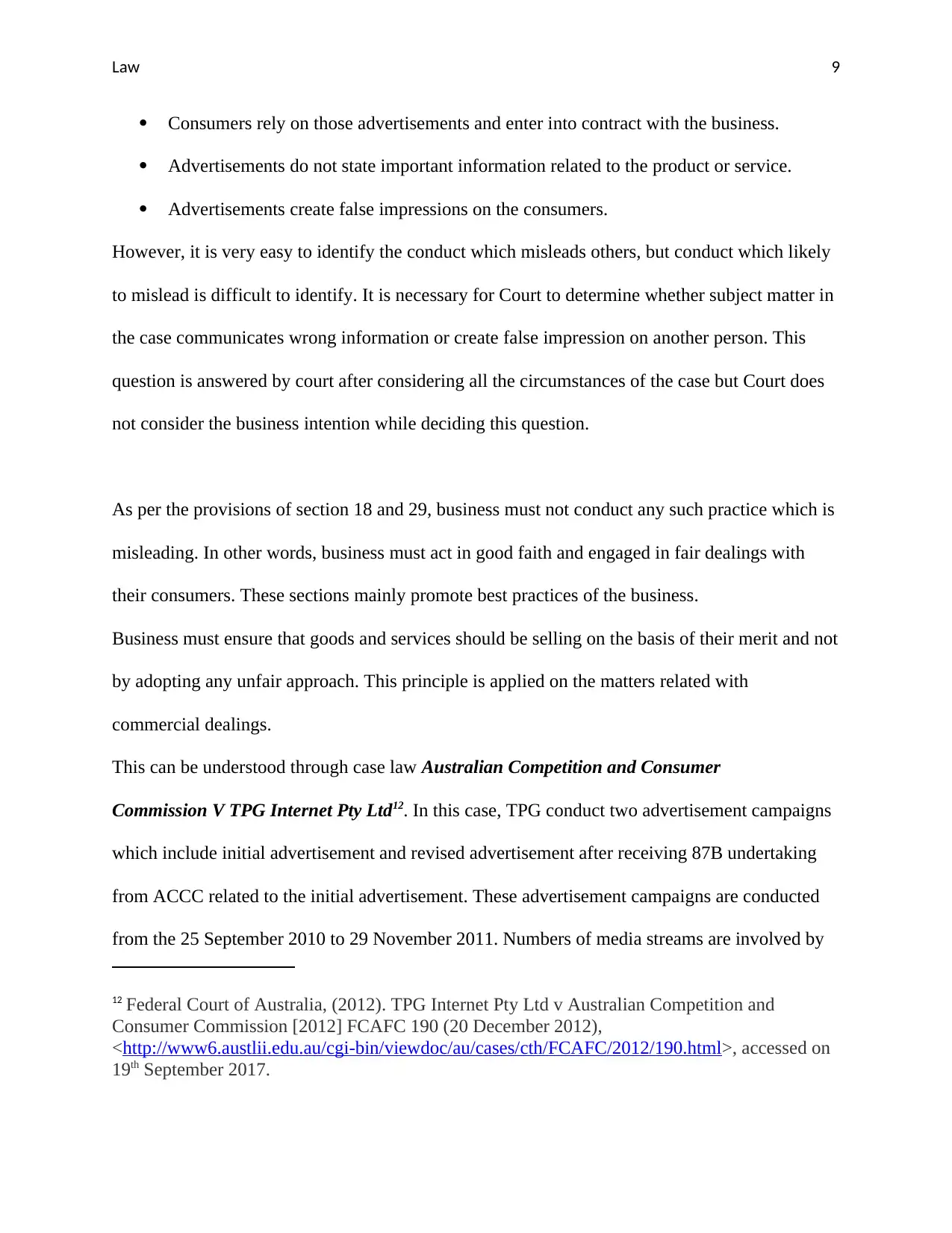
Law 9
Consumers rely on those advertisements and enter into contract with the business.
Advertisements do not state important information related to the product or service.
Advertisements create false impressions on the consumers.
However, it is very easy to identify the conduct which misleads others, but conduct which likely
to mislead is difficult to identify. It is necessary for Court to determine whether subject matter in
the case communicates wrong information or create false impression on another person. This
question is answered by court after considering all the circumstances of the case but Court does
not consider the business intention while deciding this question.
As per the provisions of section 18 and 29, business must not conduct any such practice which is
misleading. In other words, business must act in good faith and engaged in fair dealings with
their consumers. These sections mainly promote best practices of the business.
Business must ensure that goods and services should be selling on the basis of their merit and not
by adopting any unfair approach. This principle is applied on the matters related with
commercial dealings.
This can be understood through case law Australian Competition and Consumer
Commission V TPG Internet Pty Ltd12. In this case, TPG conduct two advertisement campaigns
which include initial advertisement and revised advertisement after receiving 87B undertaking
from ACCC related to the initial advertisement. These advertisement campaigns are conducted
from the 25 September 2010 to 29 November 2011. Numbers of media streams are involved by
12 Federal Court of Australia, (2012). TPG Internet Pty Ltd v Australian Competition and
Consumer Commission [2012] FCAFC 190 (20 December 2012),
<http://www6.austlii.edu.au/cgi-bin/viewdoc/au/cases/cth/FCAFC/2012/190.html>, accessed on
19th September 2017.
Consumers rely on those advertisements and enter into contract with the business.
Advertisements do not state important information related to the product or service.
Advertisements create false impressions on the consumers.
However, it is very easy to identify the conduct which misleads others, but conduct which likely
to mislead is difficult to identify. It is necessary for Court to determine whether subject matter in
the case communicates wrong information or create false impression on another person. This
question is answered by court after considering all the circumstances of the case but Court does
not consider the business intention while deciding this question.
As per the provisions of section 18 and 29, business must not conduct any such practice which is
misleading. In other words, business must act in good faith and engaged in fair dealings with
their consumers. These sections mainly promote best practices of the business.
Business must ensure that goods and services should be selling on the basis of their merit and not
by adopting any unfair approach. This principle is applied on the matters related with
commercial dealings.
This can be understood through case law Australian Competition and Consumer
Commission V TPG Internet Pty Ltd12. In this case, TPG conduct two advertisement campaigns
which include initial advertisement and revised advertisement after receiving 87B undertaking
from ACCC related to the initial advertisement. These advertisement campaigns are conducted
from the 25 September 2010 to 29 November 2011. Numbers of media streams are involved by
12 Federal Court of Australia, (2012). TPG Internet Pty Ltd v Australian Competition and
Consumer Commission [2012] FCAFC 190 (20 December 2012),
<http://www6.austlii.edu.au/cgi-bin/viewdoc/au/cases/cth/FCAFC/2012/190.html>, accessed on
19th September 2017.
⊘ This is a preview!⊘
Do you want full access?
Subscribe today to unlock all pages.

Trusted by 1+ million students worldwide
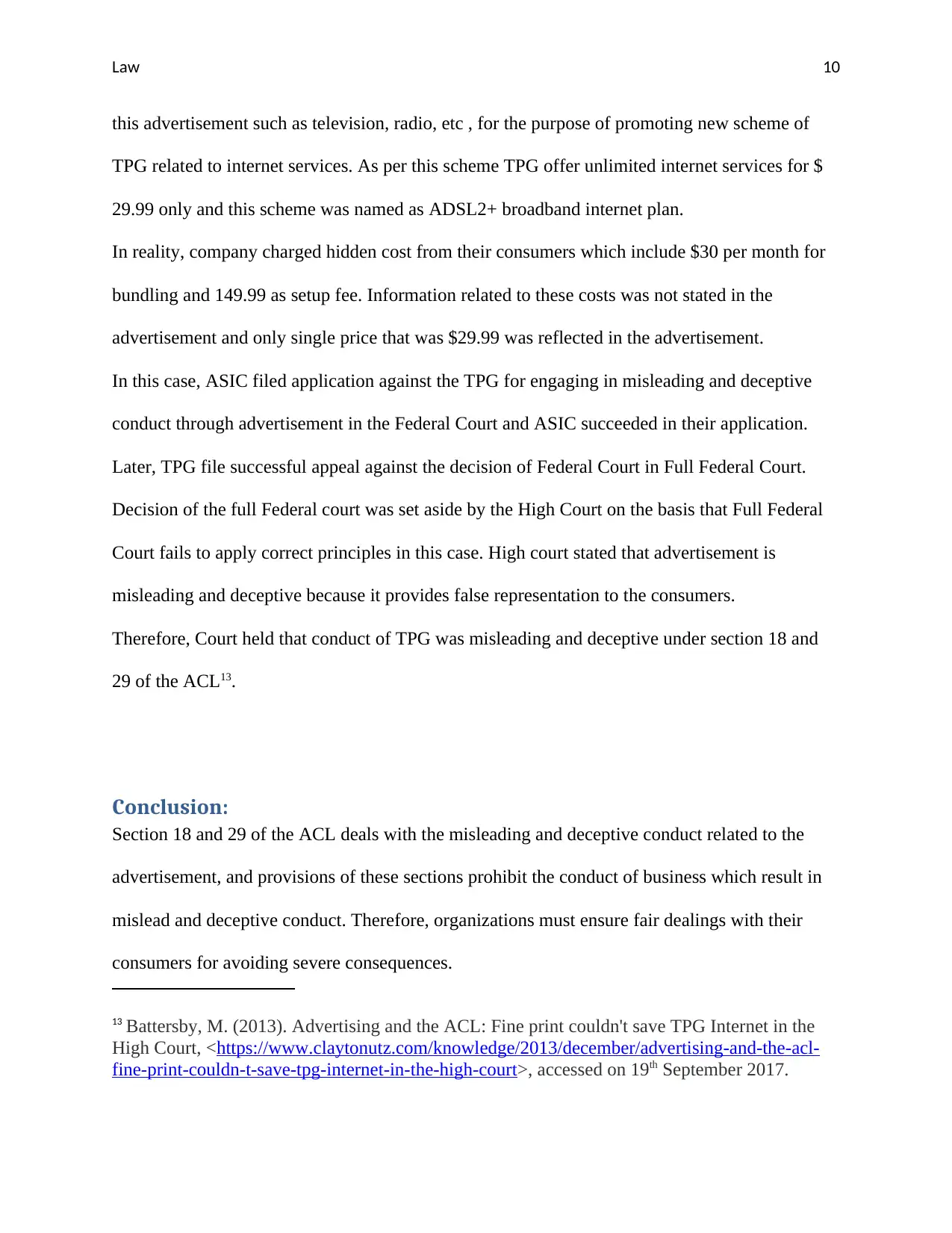
Law 10
this advertisement such as television, radio, etc , for the purpose of promoting new scheme of
TPG related to internet services. As per this scheme TPG offer unlimited internet services for $
29.99 only and this scheme was named as ADSL2+ broadband internet plan.
In reality, company charged hidden cost from their consumers which include $30 per month for
bundling and 149.99 as setup fee. Information related to these costs was not stated in the
advertisement and only single price that was $29.99 was reflected in the advertisement.
In this case, ASIC filed application against the TPG for engaging in misleading and deceptive
conduct through advertisement in the Federal Court and ASIC succeeded in their application.
Later, TPG file successful appeal against the decision of Federal Court in Full Federal Court.
Decision of the full Federal court was set aside by the High Court on the basis that Full Federal
Court fails to apply correct principles in this case. High court stated that advertisement is
misleading and deceptive because it provides false representation to the consumers.
Therefore, Court held that conduct of TPG was misleading and deceptive under section 18 and
29 of the ACL13.
Conclusion:
Section 18 and 29 of the ACL deals with the misleading and deceptive conduct related to the
advertisement, and provisions of these sections prohibit the conduct of business which result in
mislead and deceptive conduct. Therefore, organizations must ensure fair dealings with their
consumers for avoiding severe consequences.
13 Battersby, M. (2013). Advertising and the ACL: Fine print couldn't save TPG Internet in the
High Court, <https://www.claytonutz.com/knowledge/2013/december/advertising-and-the-acl-
fine-print-couldn-t-save-tpg-internet-in-the-high-court>, accessed on 19th September 2017.
this advertisement such as television, radio, etc , for the purpose of promoting new scheme of
TPG related to internet services. As per this scheme TPG offer unlimited internet services for $
29.99 only and this scheme was named as ADSL2+ broadband internet plan.
In reality, company charged hidden cost from their consumers which include $30 per month for
bundling and 149.99 as setup fee. Information related to these costs was not stated in the
advertisement and only single price that was $29.99 was reflected in the advertisement.
In this case, ASIC filed application against the TPG for engaging in misleading and deceptive
conduct through advertisement in the Federal Court and ASIC succeeded in their application.
Later, TPG file successful appeal against the decision of Federal Court in Full Federal Court.
Decision of the full Federal court was set aside by the High Court on the basis that Full Federal
Court fails to apply correct principles in this case. High court stated that advertisement is
misleading and deceptive because it provides false representation to the consumers.
Therefore, Court held that conduct of TPG was misleading and deceptive under section 18 and
29 of the ACL13.
Conclusion:
Section 18 and 29 of the ACL deals with the misleading and deceptive conduct related to the
advertisement, and provisions of these sections prohibit the conduct of business which result in
mislead and deceptive conduct. Therefore, organizations must ensure fair dealings with their
consumers for avoiding severe consequences.
13 Battersby, M. (2013). Advertising and the ACL: Fine print couldn't save TPG Internet in the
High Court, <https://www.claytonutz.com/knowledge/2013/december/advertising-and-the-acl-
fine-print-couldn-t-save-tpg-internet-in-the-high-court>, accessed on 19th September 2017.
Paraphrase This Document
Need a fresh take? Get an instant paraphrase of this document with our AI Paraphraser

Law 11
BIBLIOGRAPHY
Website
BIBLIOGRAPHY
Website
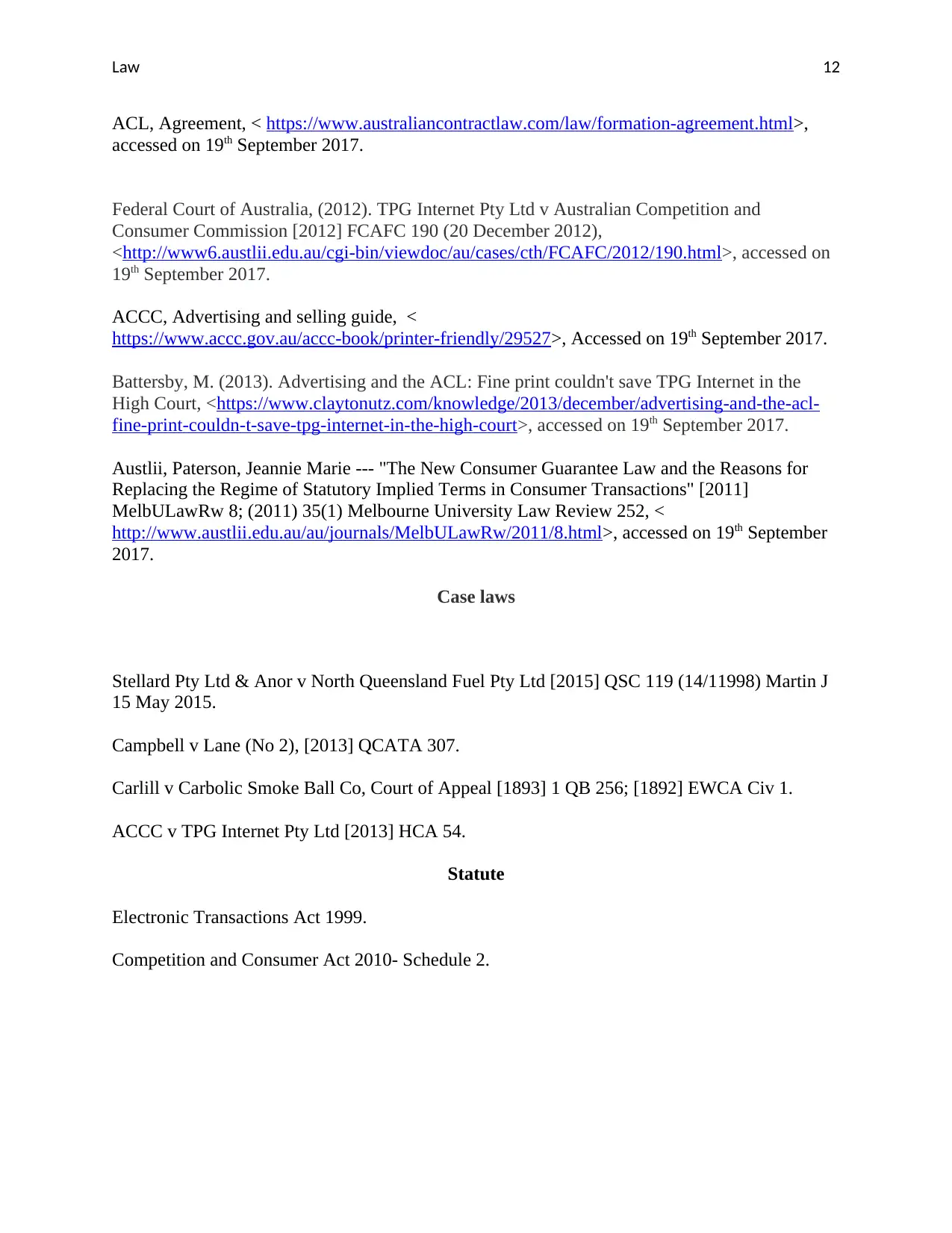
Law 12
ACL, Agreement, < https://www.australiancontractlaw.com/law/formation-agreement.html>,
accessed on 19th September 2017.
Federal Court of Australia, (2012). TPG Internet Pty Ltd v Australian Competition and
Consumer Commission [2012] FCAFC 190 (20 December 2012),
<http://www6.austlii.edu.au/cgi-bin/viewdoc/au/cases/cth/FCAFC/2012/190.html>, accessed on
19th September 2017.
ACCC, Advertising and selling guide, <
https://www.accc.gov.au/accc-book/printer-friendly/29527>, Accessed on 19th September 2017.
Battersby, M. (2013). Advertising and the ACL: Fine print couldn't save TPG Internet in the
High Court, <https://www.claytonutz.com/knowledge/2013/december/advertising-and-the-acl-
fine-print-couldn-t-save-tpg-internet-in-the-high-court>, accessed on 19th September 2017.
Austlii, Paterson, Jeannie Marie --- "The New Consumer Guarantee Law and the Reasons for
Replacing the Regime of Statutory Implied Terms in Consumer Transactions" [2011]
MelbULawRw 8; (2011) 35(1) Melbourne University Law Review 252, <
http://www.austlii.edu.au/au/journals/MelbULawRw/2011/8.html>, accessed on 19th September
2017.
Case laws
Stellard Pty Ltd & Anor v North Queensland Fuel Pty Ltd [2015] QSC 119 (14/11998) Martin J
15 May 2015.
Campbell v Lane (No 2), [2013] QCATA 307.
Carlill v Carbolic Smoke Ball Co, Court of Appeal [1893] 1 QB 256; [1892] EWCA Civ 1.
ACCC v TPG Internet Pty Ltd [2013] HCA 54.
Statute
Electronic Transactions Act 1999.
Competition and Consumer Act 2010- Schedule 2.
ACL, Agreement, < https://www.australiancontractlaw.com/law/formation-agreement.html>,
accessed on 19th September 2017.
Federal Court of Australia, (2012). TPG Internet Pty Ltd v Australian Competition and
Consumer Commission [2012] FCAFC 190 (20 December 2012),
<http://www6.austlii.edu.au/cgi-bin/viewdoc/au/cases/cth/FCAFC/2012/190.html>, accessed on
19th September 2017.
ACCC, Advertising and selling guide, <
https://www.accc.gov.au/accc-book/printer-friendly/29527>, Accessed on 19th September 2017.
Battersby, M. (2013). Advertising and the ACL: Fine print couldn't save TPG Internet in the
High Court, <https://www.claytonutz.com/knowledge/2013/december/advertising-and-the-acl-
fine-print-couldn-t-save-tpg-internet-in-the-high-court>, accessed on 19th September 2017.
Austlii, Paterson, Jeannie Marie --- "The New Consumer Guarantee Law and the Reasons for
Replacing the Regime of Statutory Implied Terms in Consumer Transactions" [2011]
MelbULawRw 8; (2011) 35(1) Melbourne University Law Review 252, <
http://www.austlii.edu.au/au/journals/MelbULawRw/2011/8.html>, accessed on 19th September
2017.
Case laws
Stellard Pty Ltd & Anor v North Queensland Fuel Pty Ltd [2015] QSC 119 (14/11998) Martin J
15 May 2015.
Campbell v Lane (No 2), [2013] QCATA 307.
Carlill v Carbolic Smoke Ball Co, Court of Appeal [1893] 1 QB 256; [1892] EWCA Civ 1.
ACCC v TPG Internet Pty Ltd [2013] HCA 54.
Statute
Electronic Transactions Act 1999.
Competition and Consumer Act 2010- Schedule 2.
⊘ This is a preview!⊘
Do you want full access?
Subscribe today to unlock all pages.

Trusted by 1+ million students worldwide
1 out of 12
Related Documents
Your All-in-One AI-Powered Toolkit for Academic Success.
+13062052269
info@desklib.com
Available 24*7 on WhatsApp / Email
![[object Object]](/_next/static/media/star-bottom.7253800d.svg)
Unlock your academic potential
Copyright © 2020–2026 A2Z Services. All Rights Reserved. Developed and managed by ZUCOL.





